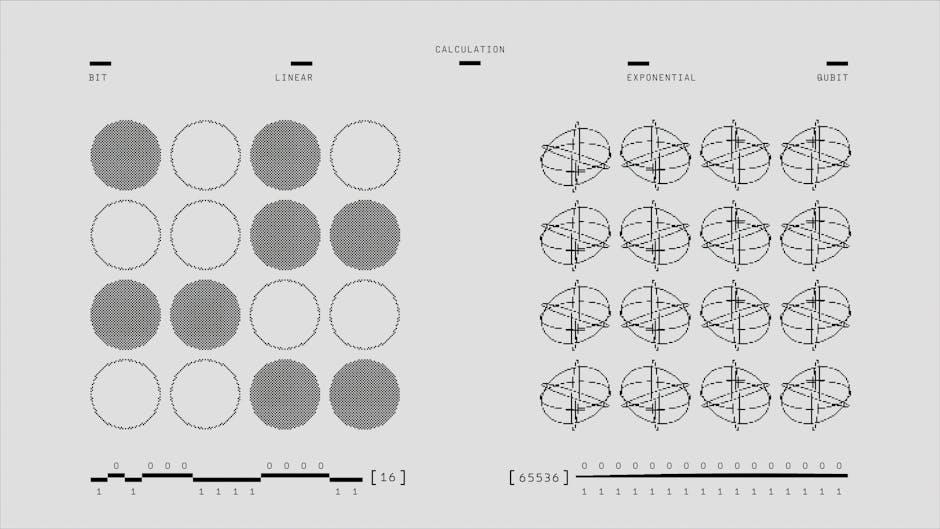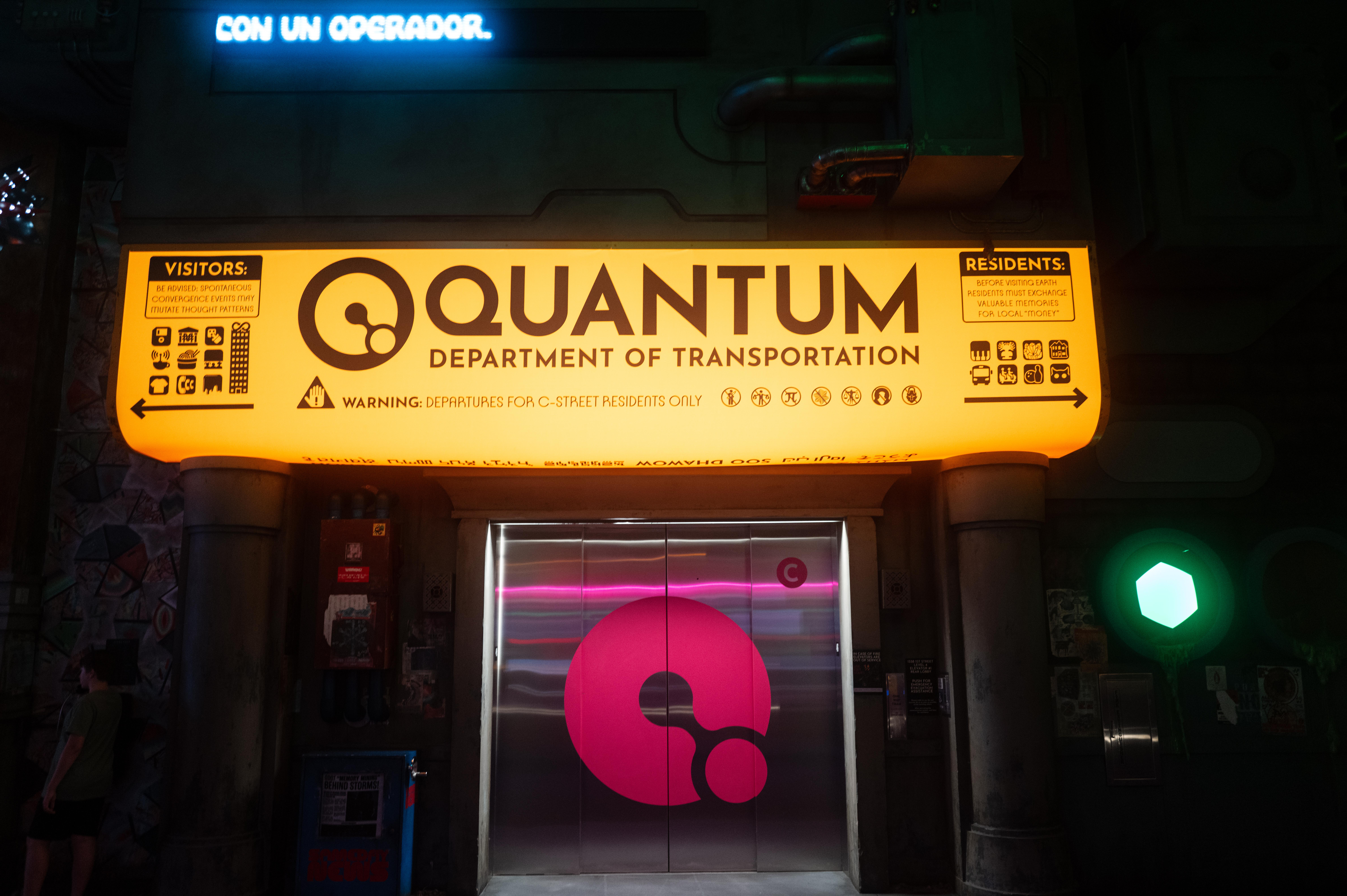Table of Contents
- Exploring the Technology Behind Quantum Game Controllers
- The Benefits of Quantum Mechanics in Gaming Experience
- Design Innovations That Elevate Player Interaction
- Choosing the Right Quantum Game Controller for Your Setup
- Future Trends in Quantum Gaming Technology
- Q&A
- Key Takeaways


Exploring the Technology Behind Quantum Game Controllers
The landscape of gaming is undergoing a remarkable transformation with the advent of quantum game controllers. By harnessing the principles of quantum mechanics, these innovative devices promise to enhance gameplay experiences in ways previously thought impossible. Quantum entanglement and superposition are at the heart of this technology, allowing for unprecedented processing speed and responsiveness. Players can expect smoother interactions and a heightened sense of immersion as game controllers become more attuned to user inputs than ever before.
One of the standout features of quantum game controllers is their ability to process multiple inputs simultaneously, thanks to the quantum bits or qubits that replace traditional binary bits. This means a controller can register varying commands in real-time, creating a seamless gaming environment. The integration of quantum algorithms enables advanced predictive responses, adjusting gameplay based on a player’s actions almost instantaneously. For developers, this opens up avenues for creating more complex in-game environments that respond dynamically to player choices.
Moreover, the potential for cross-platform compatibility is enhanced through quantum technology. Developers can design games that leverage quantum computing power while still running on conventional gaming systems, making high-fidelity experiences accessible to a wider audience. As this technology continues to evolve, it will be exciting to witness how quantum game controllers reshape not just individual gameplay, but the very fabric of gaming culture. Here’s a quick comparison table illustrating traditional controllers versus quantum controllers in various aspects:
| Feature | Traditional Controllers | Quantum Game Controllers |
|---|---|---|
| Input Processing | Sequential | Simultaneous |
| Response Time | Standard | Instantaneous |
| Cross-Platform Play | Limited | Enhanced |
| Complexity of Games | Moderate | High |


The Benefits of Quantum Mechanics in Gaming Experience
The integration of quantum mechanics into gaming enhances the overall experience by unlocking new possibilities in gameplay and interaction. By employing principles such as superposition and entanglement, game developers can create environments that respond dynamically to player actions, leading to a more immersive experience. Imagine a world where the choices you make in-game have multiple outcomes simultaneously, adding layers of strategy and excitement that advance every gaming session.
Moreover, quantum computing significantly improves the processing power available for game development. This leap in technology enables the creation of complex simulations and graphics, as well as advanced AI that can learn and adapt to player behavior in real-time. As a result, gamers can expect:
- Realistic simulations that mirror real-world physics with unprecedented accuracy.
- Adaptive storytelling, where narratives evolve based on player decisions.
- Enhanced multiplayer experiences that allow seamless interaction across vast networks without latency issues.
Additionally, quantum mechanics introduces innovative concepts to game mechanics that enhance engagement. For instance, teleportation mechanisms could allow players to navigate worlds with greater fluidity while also inspiring unique multiplayer dynamics. Through the utilization of quantum states, developers can craft game mechanics that allow for truly unpredictable and exciting player encounters, fostering a sense of exploration and spontaneity that keeps players returning for more.
Design Innovations That Elevate Player Interaction
As gaming technology evolves, so too does the design of controllers, crucial for enhancing player engagement and immersion. The quantum game controller integrates cutting-edge technology, allowing for a more intuitive and responsive gaming experience. With elements such as haptic feedback and adaptive triggers, players can feel the nuances of various terrains and actions, making the gameplay more lifelike. This level of interaction invites players to experience games more emotionally, impacting everything from tension during critical moments to joy in completing challenges.
Moreover, the inclusion of customizable features elevates personalization, enabling players to tailor their gaming experience. Features might include:
- Adjustable sensitivity settings: Allowing players to fine-tune how their controller responds to movements.
- Swappable components: Giving fans the ability to change out buttons and sticks based on preference and gaming style.
- Integration with AR technology: Creating a hybrid experience that blends physical actions with digital responses.
The rise of multiplayer gaming has also driven design innovations, where communication and cooperation are essential. Quantum controllers support seamless pairing with other devices while maintaining low latency, ensuring smooth gameplay across networks. Furthermore, the inclusion of voice command features can facilitate teamwork without taking players’ attention away from the screen. To visualize player interaction enhancements, consider the following benefits:
| Feature | Benefit |
|---|---|
| Haptic Feedback | Enhances immersion with realistic sensations. |
| Modular Design | Offers personalized gameplay experiences. |
| Voice Commands | Improves team coordination in multiplayer settings. |


Choosing the Right Quantum Game Controller for Your Setup
When selecting a quantum game controller, compatibility with your existing setup is crucial. Ensure that the controller supports your gaming platform—be it PC, console, or VR systems—to avoid any potential integration issues. Additionally, consider the type of games you play. Some controllers are optimized for specific genres, enhancing your overall gaming experience. Look for versatile options that can adapt to various gameplay styles. Pay attention to the controller’s connectivity as well; choose between wired, wireless, or hybrid models to fit your preferences.
Ergonomics and design also play a significant role in your choice. A well-designed controller will not only feel comfortable during extended gaming sessions but will also provide intuitive access to controls. Evaluate the layout of buttons, sticks, and triggers—these elements can greatly affect your performance in fast-paced environments. Opt for controllers that offer customizable features, such as adjustable sensitivity and programmable buttons, allowing for a tailored gaming experience. Some additional design considerations include:
- Weight: Feel the controller’s weight in your hands; it can affect your gaming endurance.
- Grip: Look for textured grips that prevent slipping during intense gameplay.
- Battery Life: Wireless controllers should have long-lasting batteries to minimize downtime.
research the innovative features that quantum game controllers might offer. Some of them come equipped with advanced haptic feedback systems and motion sensors, delivering a more immersive experience. A robust online community and developer support can also enhance your experience, providing resources for troubleshooting, customization, and updates. When comparing models, consider creating a simple comparison table to streamline your decision-making process:
| Feature | Controller A | Controller B |
|---|---|---|
| Connectivity | Wireless | Wired/Wireless |
| Ergonomic Design | Yes | No |
| Battery Life | 20 hours | 10 hours |
| Customizable Buttons | Yes | No |


Future Trends in Quantum Gaming Technology
The rapid evolution of quantum technology is set to redefine the gaming landscape, particularly through innovations in controller design that harness quantum principles. One of the most exciting prospects is the integration of quantum computing into game controllers, which can enable ultra-responsive inputs and dynamic game mechanics. By utilizing quantum bits (qubits), these controllers could process vast amounts of information more efficiently, leading to immersive gaming experiences that adapt in real time based on player behavior and choices.
Moreover, the advent of quantum entanglement could pave the way for multiplayer experiences that transcend geographical limitations. Imagine a scenario where players from different parts of the world can interact within a game environment with virtually no latency. With quantum network capabilities, data exchange becomes instantaneous, allowing for seamless collaboration and competition. In addition, the use of quantum secure communications will ensure that player data is protected against hacking, providing a safer gaming experience.
As developers experiment with the fusion of quantum systems and traditional gaming technologies, we may soon encounter innovative features such as:
- Personalized AI companions: Tailored to individual gaming styles, they can learn and adapt through quantum processing power.
- Enhanced graphics rendering: Real-time graphics improvements using quantum algorithms that push the limits of visual fidelity.
- Complex scenarios generation: Dynamic environments that evolve based on player interactions, creating a unique gameplay experience for everyone.
| Feature | Description |
|---|---|
| Quantum Input Processing | Revolutionary speed and precision for player commands. |
| Global Multiplayer Experience | Instant data transfer for real-time player interactions. |
| Customizable Game Worlds | Adaptive environments tailored to player behavior. |
Q&A
Q&A: Understanding Quantum Game Controllers
Q1: What is a quantum game controller? A1: A quantum game controller is an innovative gaming device that leverages quantum computing principles to enhance the gaming experience. Unlike traditional controllers, quantum controllers can process multiple possibilities simultaneously, potentially providing gamers with faster responses and more realistic interactions within games.Q2: How does a quantum game controller differ from a traditional controller? A2: Traditional game controllers operate on binary logic, processing commands in a linear fashion. In contrast, quantum game controllers utilize qubits, enabling them to handle complex calculations more efficiently. This means that they could analyze multiple game scenarios at once, potentially leading to more immersive gameplay and dynamic reactiveness that adapts to player strategies.
Q3: What are the potential benefits of using a quantum game controller? A3: The benefits of quantum game controllers could be significant. They may offer enhanced gameplay mechanics through more realistic physics simulations, reduced latency, and more intelligent AI opponents. Additionally, the ability to process data at extraordinary speeds could lead to innovative game designs that were previously unattainable with classical technology.
Q4: Are there any games currently compatible with quantum game controllers? A4: As of now, there are limited games specifically designed for quantum game controllers, primarily because the technology is still in its infancy. However, as developers begin to experiment with quantum computing in gaming, we can expect to see titles that are optimized to fully utilize the unique capabilities of these controllers.
Q5: What should developers consider when creating games for quantum controllers? A5: Developers need to rethink traditional game design principles when working with quantum controllers. This includes exploring non-linear gameplay mechanics, re-evaluating AI complexity, and creating environments that can dynamically change based on player interactions. Understanding quantum mechanics and its implications for gameplay will be crucial for leveraging the full potential of this technology.
Q6: Are quantum game controllers available for consumers? A6: Currently, quantum game controllers are not widely available for consumers. Much of the research and development is happening within tech firms and academic laboratories. However, as the technology matures and production methods become more viable, we can expect to see prototypes and commercial versions emerge in the market.
Q7: What does the future hold for quantum game controllers? A7: The future of quantum game controllers is promising, with potential breakthroughs in both gaming and computing. As quantum technology advances, we may witness a revolution in gaming hardware that introduces entirely new ways to interact with digital worlds, blending entertainment and technology in unprecedented ways. The possible integration of virtual reality and augmented reality with quantum controllers could further enhance this experience.
Q8: How can gamers prepare for the quantum gaming era? A8: Gamers can start by staying informed about developments in quantum technology and its applications in gaming. Engaging with communities that focus on the intersection of gaming and technology will also be beneficial. Being open to experimenting with new gameplay styles and devices will help gamers adapt when quantum game controllers finally hit the market.
With these insights, we can see that while still an emerging field, quantum game controllers offer a glimpse into the future of interactive entertainment, promising an evolution in how we play and experience games.




0 Comments